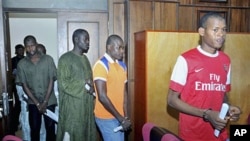Nigeria's government says Islamic militants in northern states are linked to al-Qaida-affiliated terrorists in the Sahel and in Somalia.
Definitively proving that link has brought more international attention to Nigerian terrorism, but may be overshadowing its domestic causes.
Nigeria's State Security Service says terrorists from the Boko Haram sect are linked to Somalia's al-Shabab militia, and the group al-Qaida in the Islamic Maghreb, which operates across the Sahel from Mauritania to Niger.
Boko Haram claims responsibility for the bombing of U.N. headquarters in the Nigerian capital, as well a series of assassinations and ambushes across northern states as part of what it says is a campaign for an independent, Sharia-led nation.
Linking Boko Haram to al-Qaida has made Nigerian terrorism a bigger international issue. Britain is boosting intelligence sharing and technological support. The United States is helping track Boko Haram funding through a program established after the 2001 terrorist attacks in New York and Washington.
Boko Haram's support
Shehu Sani heads Nigeria's Civil Rights Congress and has written extensively about Boko Haram. He is not convinced of the group's direct links with al-Qaida, but said it is clear there is significant outside support.
“What we still can not deny here in this country is the links between sects in Nigeria and their benefactors from other parts of the world,” said Sani.
Sani said there are many foreign-backed Islamic sects in northern Nigeria that are far larger than Boko Haram. But because they operate peacefully, they attract little outside attention. Sani said Nigeria must focus more on Boko Haram recruiting students who study abroad.
“There is no agency of government in Nigeria today that has data of young people from northern Nigeria that are in Afghanistan, that are in Yemen, that are in Pakistan, that are in countries in the Middle East. But every month, every quarter, you have hundreds of young people in northern Nigeria given scholarships to study in those countries. And there is no tracking methods. There is no follow-up. There is no vetting. And there is virtually no interest,” said Sani.
Boko Haram's methods
Nigerian defense and counter-terrorism analyst Husaini Monguno doubts al-Qaida's direct support for Boko Haram because their methods have little in common. Al-Qaida in the Islamic Maghreb, for example, principally kidnaps foreigners for ransom, while Boko Haram works within local communities to bomb crowded places.
“If you look at the pattern of al-Qaida operation, it is quite different from Boko Haram. If you happen to be a Maiduguri man or a Borno State [man], all the Boko Haram members are known," said Monguno. "They are not hidden. And they try to push for their own agenda openly. They are not afraid of anybody. But al-Qaida things are secretive. Even the intelligence community in the whole world are having difficulties in trying to see who are behind those types of operations.”
University of Abuja sociology professor Abubakar Umar Kari said the government's linking of Boko Haram to al-Qaida risks ignoring the underlying causes of the violence, which he said include poverty and injustice. It may also overlook other domestic contributors to the violence, as Kari said opponents of President Goodluck Jonathan may be using the cover of Boko Haram to mask their own political attacks.
“The more you look at it, the less you understand. But what is very, very clear is that the Boko Haram phenomenon has become a metaphor. They have become a scapegoat for whatever attack,” said Kari.
Boko Haram's violence
Monguno said political involvement with Boko Haram is most evident in how the group changed after Nigeria's 2003 election.
“What I believe the intelligence agencies should do is to try to see who are Boko Haram prior to 2003 election and after 2003 election. Boko Haram was nothing before 1999. I do believe that there are politicians who are using this group to try to perpetrate danger within the country,” said Monguno.
Sani said Boko Haram accelerated its campaign of violence following the death of its leader Mohammed Yusuf in police custody in 2009. Police said Yusuf was killed while trying to escape. Five members of the police force currently are on trial in connection with his death.
A presidential committee on northern violence says the police trial “should be expedited and publicized to convey to the public the government's sincerity on the issue.”
The committee is recommending talks with Boko Haram, but only after it renounces all forms of violence and surrenders its arms. Boko Haram has refused previous offers because of what is says is a military build-up in northern states.
